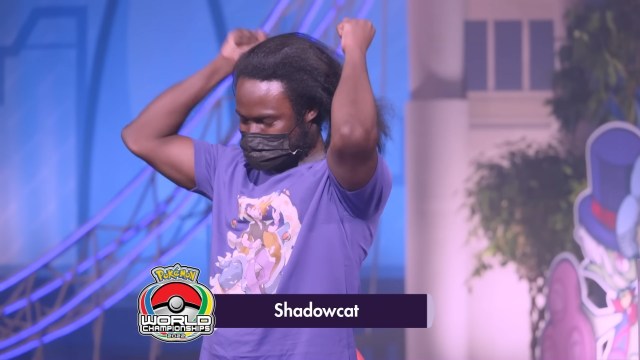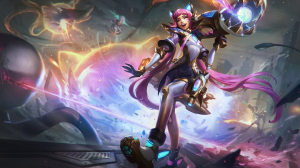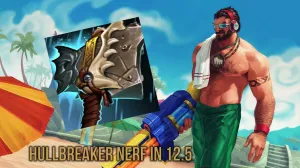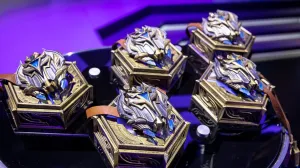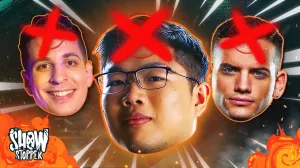Davon “Shadowcat” Amos-Hall already had many of the best accolades a Pokkén Tournament DX player could hope for. He had won an offline major and an online Players Cup.
However, there was still one major accomplishment that had eluded his grasp: winning a Pokémon World Championship. When The Pokémon Company announced in May that it would remove Pokkén from the Play! Pokémon competitive circuit at the end of the 2022 season, Shadowcat realized his time was running out.
When the 2022 Season concludes, #PokkenTournamentDX will no longer be part of the #PlayPokemon program.
We acknowledge this game’s incredible community & its unwavering support. Thank you for creating great moments and memories with us throughout the years.
Pokkén is powerful! pic.twitter.com/SD1aMIqaCa
— Play Pokémon (@playpokemon) May 26, 2022
Then, after the North America International Championships in June, it seemed Shadowcat might not get his chance at all.
He traveled to Columbus, Ohio, for the NAIC, where a top-four finish would earn him a spot at the World Championships. And, barring the on-site Last Chance Qualifier in London, the NAIC was also the final Worlds qualifier of the season, which had begun in late 2019 before the COVID-19 pandemic put it on hold.
But upon arriving at the tournament venue, Shadowcat learned he couldn’t enter because he hadn’t gotten his COVID-19 booster shots.
“I didn’t think that was a requirement,” Shadowcat said. “I had my vaccination, and I was thinking that would work out.”
The Pokémon Company ended up dropping its vaccine requirement for tournaments altogether two days after the end of the NAIC. Nevertheless, the potential favorite to win the NAIC was relegated to watching matches in his hotel room for most of the weekend with no hopes of qualifying for Worlds.
A rocky start for competitive Pokkén Tournament
Pokkén Tournament spent five seasons on the Play! Pokémon circuit, from the game’s global launch on the Wii U in March of 2016 to its farewell tour in 2022. Some of the game’s best players expressed mixed feelings about Pokkén’s inclusion on the circuit overall.
On one hand, official Pokémon events allowed them to play a game they loved with people they had come to love even more. At the same time, players said The Pokémon Company frequently made decisions that were out of touch with the desires of the Pokkén community.
During its inaugural season, Pokkén Tournament was featured at high-profile fighting game majors like Community Effort Orlando and DreamHack, alongside tournaments hosted by The Pokémon Company. Players earned points based on their performances at these tournaments that enabled them to qualify for the 2016 Pokémon World Championships.
Pokkén was even chosen to be part of the main lineup for Evo 2016, the most prestigious fighting game tournament in the world. However, the grand finals sets between Abe “Tonosama” Hisaharu and Ageta “Buntan” Kazunori proved that Pokkén wasn’t quite ready for the big stage.
“Because the game was so young, the grand finals [at Evo 2016] was Braixen vs. Suicune, and it was a very slow-paced match with a lot of projectiles,” 2018 world champion Jacob “Jukem” Waller said. “So, I think people were viewing this as a very slow, not very exciting game. Even though the players still enjoyed playing it, and as the years went by we kept discovering more stuff, that initial representation of what Pokkén was ‘like’ all the time really gave a lot of negatives [for] a lot of people.”
Despite its iconic cast of Pokémon characters and the creative mix of 2D and 3D fighting established by Tekken development team Bandai Namco, Pokkén Tournament never reached the same levels of popularity as several other fighting games (or even other Pokémon spin-offs).
While Evo 2016 holds partial blame for Pokkén’s status as a relatively niche esport, players also attributed it to the game’s poor marketing. Players claimed The Pokémon Company promoted the game well in the lead-up to its launch on the Wii U and the launch of Pokkén Tournament DX on the Switch in 2017 but didn’t put much of a spotlight on the game otherwise.
“I think [it was the poor marketing] combined with the system it launched on, which is the Wii U — which is kind of the worst console ever,” Chaz “Mewtater” Wright said. “No one really had them except for Smash players.”
Nevertheless, top players who stuck with the game praised Pokkén for its balance and expressiveness, allowing for a great deal of both character and playstyle variety at the top level. They also lauded its gameplay mechanics and the smooth transitions between its field and dual phases.
“The thing that probably stands out the most to me is how the resources in the game interact with each other,” Mewtater said. “It’s very rich in a way that most fighting games don’t provide and allows for a lot of theorycrafting with your strategy, really planning for stuff at different points in the match and coming up with ideas.”
Crowning the first world champion
The 2016 Pokémon World Championships featured 64 Pokkén Tournament players competing in a double-elimination bracket. The execution of the event was far from perfect. Jukem said players were all huddled into a small room and that The Pokémon Company hadn’t set up the points distribution properly to get enough qualified players. As a result, some attendees simply got to sign up on a first-come, first-serve basis and compete in the Pokkén World Championship.
“I feel like Pokkén was shafted a lot,” Jukem said. “As much as I love the official circuit, I can’t help but have some bitterness towards [The Pokémon Company]. But, at the same time, they’re also part of the reason why I got to be such good friends with a lot of the community members and got to have some of my highs in my career, so I’ll never hate them.”
Community is forever.
Thank you, Pokkén. pic.twitter.com/qmhP8KNgLg
— Play Pokémon (@playpokemon) August 19, 2022
While Evo champion Tonosama shockingly went 0-2 to finish in 49th place at Worlds, another Japanese player, Masami “Potetin” Sato, became the game’s first world champion. Mewtater said Japanese players were able to dominate at early Pokkén tournaments because of their community-focused growth mindset. It also helped that they had access to the game in arcades as early as the summer of 2015.
After its first World Championship, Pokkén’s presence on the Play! Pokémon circuit was downsized. Significantly fewer independent fighting game majors contributed to the circuit, and the World Championships began to feature only 16 Pokkén players.
By 2018, the only official Pokkén events were at Regional or International Championships, where the game appeared alongside other Pokémon titles. The Pokémon Company also forewent the points system, with the highest-placing players at each official event automatically qualifying for Worlds.
In essence, this meant that most Pokkén players only really got to participate in two Play! Pokémon events per year: the International Championships closest to them and the World Championships. Even so, Pokkén Tournament continued to flourish through grassroots events, where participants were able to form stronger bonds as a community.
“Most of the time, when I’m going to tournaments, I expect to play the game, but then in the aftermath to just hang out with a few friends that chat about the game and chat about life,” Shadowcat said. “Everyone is very welcoming. I like the community a lot.”
Pokkén Tournament’s Team Battle debacle
The Pokémon Company’s decisions regarding its own tournaments were often at odds with what the community was doing at grassroots events. For example, players who had the name of a Pokémon in their tag were forced to change their name when they appeared on stream at official Pokémon events.
So Jukem, who used to go by “ThankSwalot,” won the 2018 World Championship under the name “ThanksAlot.” Meanwhile, Suicune main Christian “Suicune Master” Patierno had to go by “Sui Master.” Jukem said that even Mewtater’s tag was changed to “Mutator” until a commentator told tournament organizers that they couldn’t prove his tag was related to the Pokémon Mew rather than the sound “mew.”
In 2018, #PokkenTournamentDX saw the release of Blastoise and Aegislash, and it's first US winner for the World Championship Series! After an incredible bracket reset by Tarutaro, ThanksAlot ran it back to become the Masters Pokkén World Champion! pic.twitter.com/leNQ5jhdoP
— Play Pokémon (@playpokemon) June 17, 2022
However, for several Pokkén Tournament players, The Pokémon Company’s greatest offense was the Team Battle debacle.
Team Battle was a mode introduced in Pokkén Tournament DX where players picked a team of three characters to play as over the course of a game, rather than just one. For the game’s penultimate season, The Pokémon Company picked Team Battle as the format for official Pokkén events.
“Very quickly, we realized the game’s not balanced around this,” Mewtater said. “Especially the first year, there was weirdly less character variety than 1v1.”
Top players said Team Battle’s meta was quickly solved and the format was exhausting for players and viewers alike, since players had to constantly think about multiple matchups per set and sets tended to run longer than they had before. Viewership for official Pokkén events tanked in 2019 following the introduction of this format.
Still, the players said they could have forgiven The Pokémon Company for trying something new for just one season. But then, another season of Team Battle was announced.
“It kind of created a tension between the community and Pokémon that has not really gone away,” Mewtater said. “Everything was going against it financially, from their perspective and ours, but then they just did it again and it was like, ‘Oh, OK, whatever. You don’t care.’”
Final round
Shortly after the return of offline events amid the COVID-19 pandemic, The Pokémon Company announced that the 2022 World Championships would mark Pokkén Tournament’s last appearance on the Play! Pokémon circuit. While the company never provided an official explanation, Mewtater speculated that it was simply because a contract had expired.
“I think that we probably wouldn’t have been there as long as we were if there wasn’t a contract,” Mewtater said. “I think that’s why they stopped caring and just had us do 3v3. If you’re a Pokémon player, it’s more akin to the normal games to see three vs. three Pokémon than one vs. one, so I think they just chose it as a branding thing and it never had anything to do with the game or community.”
Pokkén Tournament DX’s last content update came nearly four years before its final World Championship. On the surface, it would seem that more content was planned for the game, but never materialized; there is a blank slot on the character select screen that appears to be reserved for a fighter that was never put into the game.

Even before the official announcement that The Pokémon Company was retiring Pokkén Tournament DX, Mewtater said many community members saw the writing on the wall. As a result, several players preparing for the 2022 World Championships were already internally treating it like the last one.
“We wanted to make this a grand finale for Pokkén,” Jukem said.
As it turns out, multiple community members considered Shadowcat to be an integral part of that grand finale. After Shadowcat was unable to compete at the NAIC, Patrick “Euclase” Neumann started a GoFundMe to raise money so Shadowcat could fly to London and enter the Last Chance Qualifier. Within three days, the campaign had reached its $1,500 goal.
“I was surprised that people really, really wanted me to go to London just to compete for the last Pokkén event for Worlds,” Shadowcat said.
Shadowcat, who was generally considered to be at least a top-three player in North America and probably in the top-five in the world, would get another shot.
“It puts a tingle in my heart when people say that,” Shadowcat said. “Imagine being one of the best in the world at this specific game that you love doing. It’s such [an] amazing feeling.”
A ‘perfect storybook ending’ for Pokkén
The 2022 Pokémon World Championships produced an array of mixed emotions for the Pokkén Tournament players in attendance.
“The energy there was very enthusiastic, but also a bit bittersweet for the crowd there just watching the last Pokkén set for a Pokémon official event,” Jukem said.
Shadowcat in particular felt the pressure as the benefactor of the generosity of his fellow community members.
“It felt intense and it felt calm at the same time,” Shadowcat said. “I was kind of worried that I wasn’t going to perform that well, being able to fly out here. But, at the same time, I did want to spend as much time as possible with the overseas players — from Europe, from Japan — and just hang out and talk about the game and see how they’ve been doing [since] the last time I talked to them.”
Any nerves Shadowcat may have had didn’t show in his gameplay. He swept through the Last Chance Qualifier to earn a spot in the main bracket. Then, he conquered Potetin, Niklas “Wingtide” Laerbusch, Hiroki “Subutan” Ishida and Florian “M2Cloud” Blank on his path to the winners side of grand finals.
“The more I was winning, the more I was like, ‘OK, I can definitely do this,’” Shadowcat said. “I was thinking, ‘I can be champion for me, the community, for my pride.’”
Meanwhile, Mewtater had been clawing his way through the losers bracket, eliminating Potetin and M2Cloud to secure his spot on the losers side of grand finals. Going into the tournament, Mewtater cared less about winning than he did about putting on a good show.
“I wanted to put on the best performance possible,” Mewtater said. “If that meant I went 0-2, I wanted to make sure that’s because the other people that I played were just that good and they could represent the game better than I ever could.”
The result was a 10-game pair of grand finals sets that lasted over an hour. In the end, Shadowcat finally earned his first World Championship title after what multiple players called the best Pokkén Tournament set of all time.
There is NO STOPPING HIM.
From tearing through Last Chance Qualifiers to overcoming a bracket reset, Shadowcat is this weekend's STRONGEST CHALLENGER!
Congratulations to our final #PokkenTournamentDX World Champion! pic.twitter.com/zQ5w9YzNvO
— Play Pokémon (@playpokemon) August 19, 2022
“A lot of people thought I wasn’t happy,” Mewtater said. “When it first was over, they were like, ‘I’m sorry you lost.’ I was like, ‘What do you mean, bro? I’m on Cloud Nine.’ I am so happy that Shadowcat won.
“Obviously I tried to win, but I think Shadowcat winning was the perfect storybook ending to the game. He played the best he’s ever played by far, so I can’t be mad. It was just his day and he deserves it.”
What’s next for the Pokkén Tournament community
Some members of the Pokkén Tournament community suspected the game’s removal from the Play! Pokémon circuit was simply because it would be replaced by Pokkén Tournament 2. However, no such game was announced at Worlds. Still, Mewtater said technical director Masaaki Hoshino’s evident love for the game makes him think a Pokkén sequel is possible.
“At Worlds, he was in the crowd watching non-tournament matches,” Mewtater said. “He has every year, too. He doesn’t tell everyone, ‘Oh, I’m Hoshino, I’m here.’ He just walks out and he watches with the rest of us. I think that it’s very clear that he really cares about the game. I can’t blame him because he made a very, very good game.”
Mewtater said he thinks there are two potential timelines for a Pokkén Tournament sequel. It could happen in about five years once development for Tekken 8 is finished. Or, it could happen in about 20 years à la New Pokémon Snap.
Regardless of whether or when a sequel will come, tournament organizer Anthony “Rokso” Paratore is reportedly working on his own grassroots Pokkén circuit. While details have not been publicly announced, players have suggested the circuit will include qualifying tournaments that filter into a finale event.
“If people need something like Worlds to motivate them, they should stay motivated,” Mewtater said.
Jukem said the lack of official Pokémon events could also free Pokkén players up for other fighting game tournaments. He mentioned CEO, which has not featured Pokkén since 2017 because it usually takes place on or around the same date as the NAIC.
Thank you @playpokemon and the entire Pokkén community for giving me an amazing six years of memories.
From opening the door to DreamHack for me at Austin 2016, seeing Australia for my first time to run the game, & taking me to multiple Worlds events, simply thank you. pic.twitter.com/S4Fae9Ou2G
— Alex Jebailey (@Jebailey) August 19, 2022
In the meantime, the game maintains an active online presence with weekly events hosted through the community’s Discord server.
“Even for a game this old, people are still playing and loving this game,” Jukem said. “We’ve had players come and go, obviously, but for the most part, a lot of these players have been playing since the very beginning and are supporting a lot of the newer players. If someone asks me something, I’ll just help them and then some because I just love doing it, and I know a lot of my friends feel that exact same way. It’s kind of one big fighting game family in my opinion.”
Pokkén Tournament players have persisted through content droughts, a lack of mainstream popularity, questionable competitive formats and more. Even now that official developer support has been withdrawn, it seems that community members will continue to live by a mantra they have already clung to for years: Long live Pokkén.



